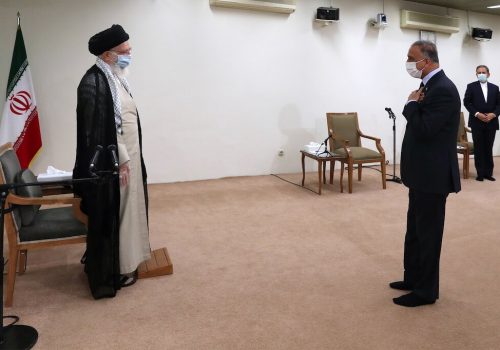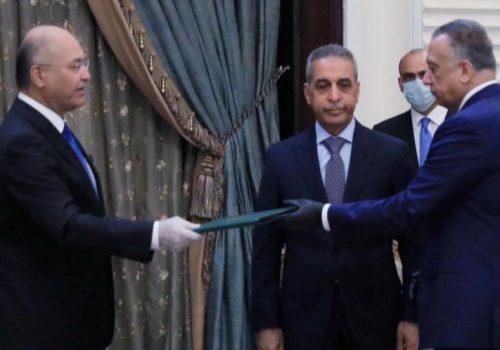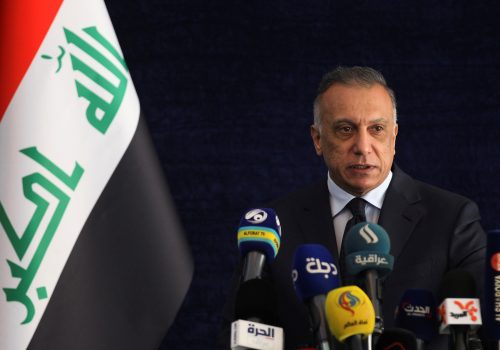Why did Iran back Mustafa al-Kadhimi as Iraqi prime minister?
Iraq’s new Prime Minister, Mustafa al-Kadhimi, doesn’t seem like Iran’s ideal candidate for the job.
Compared to his predecessors, Kadhimi does not have an intimate history with the Islamic Republic. He lived most of his exile years in the United Kingdom and the United States, where he still enjoys well-established connections. As head of Iraq’s Intelligence Service, he managed to cement those ties while attempting to balance them by bolstering his relations with Tehran.
Many Western commentators viewed his premiership as a blow to Iran’s influence in Iraq. Yet, given Iran’s influence over many Iraqi political factions, Kadhimi could not have gotten the job without Tehran’s backing or at least tacit consent. The question is: does Tehran’s support indicate a shift in its post-Qasem Soleimani Iraq policy?
It is important to note that choosing the head of the Iraqi state has never been Iran’s main concern—though it had its preferred candidates. A key reason for this is that the American-installed political structure in Iraq after the 2003 overthrow of Saddam Hussein has never really been successful in terms of fulfilling the main responsibilities of a state: providing security and basic necessities of life to the Iraqi people.
While US policymakers primarily focus on conventional metrics, Iran is playing a different game on the ground. The infamous power-sharing process among the Iraqi political elite, which is necessary to form any Iraqi government, further divides an already weak central state. During the past two decades, Iran has instead remained focused on the targeted containment of threats and building organic relationships with Iraqi society—focusing the bulk of its attention toward averting any serious national security threats emanating from Iraq. Other issues, including the premiership, come second and are measured in accordance with that policy. Thus in 2006, 2014 and now, Iran has supported candidates that were not its first choice.
Tehran is more concerned with how its Iraq policy affects its efforts to undercut the Trump administration’s “maximum pressure” campaign—which was obvious in its official visits to Iraq, including the July 19 visit of Foreign Minister Mohammad Javad Zarif. Iran seeks to reduce Iraqi divergence over ties with Tehran. Here, Kadhimi’s balancing act between Iran and the US is deemed quite useful. Speaking to the US ambassador after being sworn in, Kadhimi stated that “Iraq will not be a ground for settling accounts and launching attacks on any neighboring or friendly country”—a reference to the US assassinations of Quds Force commander Soleimani and Abu Mahdi al-Muhandis, deputy leader of Iraq’s Popular Mobilization Units (PMU), on Iraqi soil in January. Reiterating this in his meeting with the Iranian ambassador, Kadhimi was in line with Tehran’s calculus, which rejects the US use of Baghdad as a proxy theater in its maximum pressure campaign. This was one of his main assurances to Tehran in his first foreign visit: “Iraq would not allow any threat to Iran coming from its territory.”
The former head of Iraqi intelligence understands that his potential moves against Iranian influence, unlike the US presence and influence, would require moving against Iraqi nationals—such as the arrests of Kataib Hezbollah members back in June and their release soon after. Iran’s Supreme Leader Ayatollah Ali Khamenei was more open on this saying that alongside Iraq’s Ayatollah Sistani, “[The] Popular Mobilization Units are another great blessing in Iraq, which should be safeguarded.” In other words, Iran will be supporting Kadhimi’s government provided that he doesn’t act in accordance with US priorities: targeting the PMU and Iranian allies more broadly. This conditional support is one of the main messages Kadhimi got in his confidence-building mission to Tehran.
Iran is paving the way for Iraqis to engineer a US military withdrawal—as the Iraqi parliament requested in a nonbinding vote in January. While Tehran obviously wants the US out, it recognizes that this is ultimately an Iraqi call—as emphasized to Kadhimi by Iran’s Supreme Leader. Accordingly, a middle-ground government can play an effective role in reshaping the US-Iraq strategic partnership. Within the US-Iraq strategic dialogue that began June 11, Iraq can push more freely for a US withdrawal or significant reduction in military presence. Iran’s allies, including the PMUs that backed Kadhimi, can pressurize the government on every aspect of the dialogue, including a US withdrawal.
To validate his balanced approach, Kadhimi will likely push for either a complete US withdrawal or a significant drawdown—or face internal pressure. Reiterating that the US does not seek permanent bases in Iraq and that it will continue reducing the number of its forces there, the joint statement of US-Iraq strategic dialogue on June 11 was in line with this interpretation.
Ironically, Iran is intentionally stepping back to allow the US to get more involved with this new government in order to have Washington shoulder more of the blame that Tehran used to bear for its support of the Iraqi political system. Militarily, Iran is continuing its pressure on the US, but by reducing its direct involvement and sub-contracting its role to Iraqi militias, as rocket attacks in mid-March—which killed two Americans and a British citizen—indicate. Both the head of Iran’s National Security Council and the new commander of the Islamic Revolutionary Guard Corps’ Quds Force are reported to have said in their recent visits to Baghdad that Tehran will decrease involvement in Iraq. Iran is cognizant of street politics in its calculus in Iraq and the fact that protests in Iraq last fall were often hostile to Tehran—and included the torching of the Iranian consulate in Najaf.
An openly Iran-allied government is now a more costly option—with anti-Iran factions resorting to street protests and prolonging the Iraqi crisis. Kadhimi’s premiership was in part a result of street politics; Iraqi President Barham Salih openly admitted he was defying the constitution by rejecting a nominally pro-Iran candidate put forth by the parliament after Adil Abdul-Mahdi stepped down. Another wave of protests could easily upset the shaky balance behind Kadhimi and end his tenure. Whether Kadhimi delivers on his agenda, including reducing the US military presence, will determine his political future and be decided by a combination of both street and formal politics. Despite mutual accusations and different narrations, the killing of prominent Iraqi expert Hisham al-Hashimi suggests that time is already running against Kadhimi.
Overall, Iran is confident that an anti-Iran shift in Iraqi politics is impossible. One main aim of Zarif’s visit to Baghdad as well as Iran’s impressive receiving of Kadhimi in Tehran was to demonstrate this confidence. While wrestling to balance internal and external actors, Kadhimi’s government is faced with a record drop in oil prices and a health crisis along with a continuation of street protests. In his short tenure, Kadhimi cannot do much except to push for a more balanced and stable situation in Iraq. And for that he needs a functioning relationship with Tehran as the messaging surrounding his visit to Tehran suggests.
Kadhimi is close enough to the US not to be labeled an Iran proxy if he demands a revision of previous agreements; he has good enough ties with Iran to keep a functional relationship with Tehran. Iran is hoping for a win-win situation from its point of view: a stabilized Iraq that also reduces the US presence. If Kadhimi fails, however, that is more likely to be blamed on Washington. Thus the choice of Kadhimi, while not ideal, is a rational one for Iran.
Hassan Ahmadian is an assistant professor of West Asia and North Africa studies at the University of Tehran and a former Postdoctoral Research Fellow at the Iran Project, Harvard Kennedy School Belfer Center for Science and International Affairs. Follow on Twitter: @hasanahmadian.
Image: Iranian President Hassan Rouhani and the Iraqi Prime Minister Mustafa al-Kadhimi attend a news conference as they wear protective masks, in Tehran, Iran, July 21 2020. Official Presidential website/Handout via REUTERS


